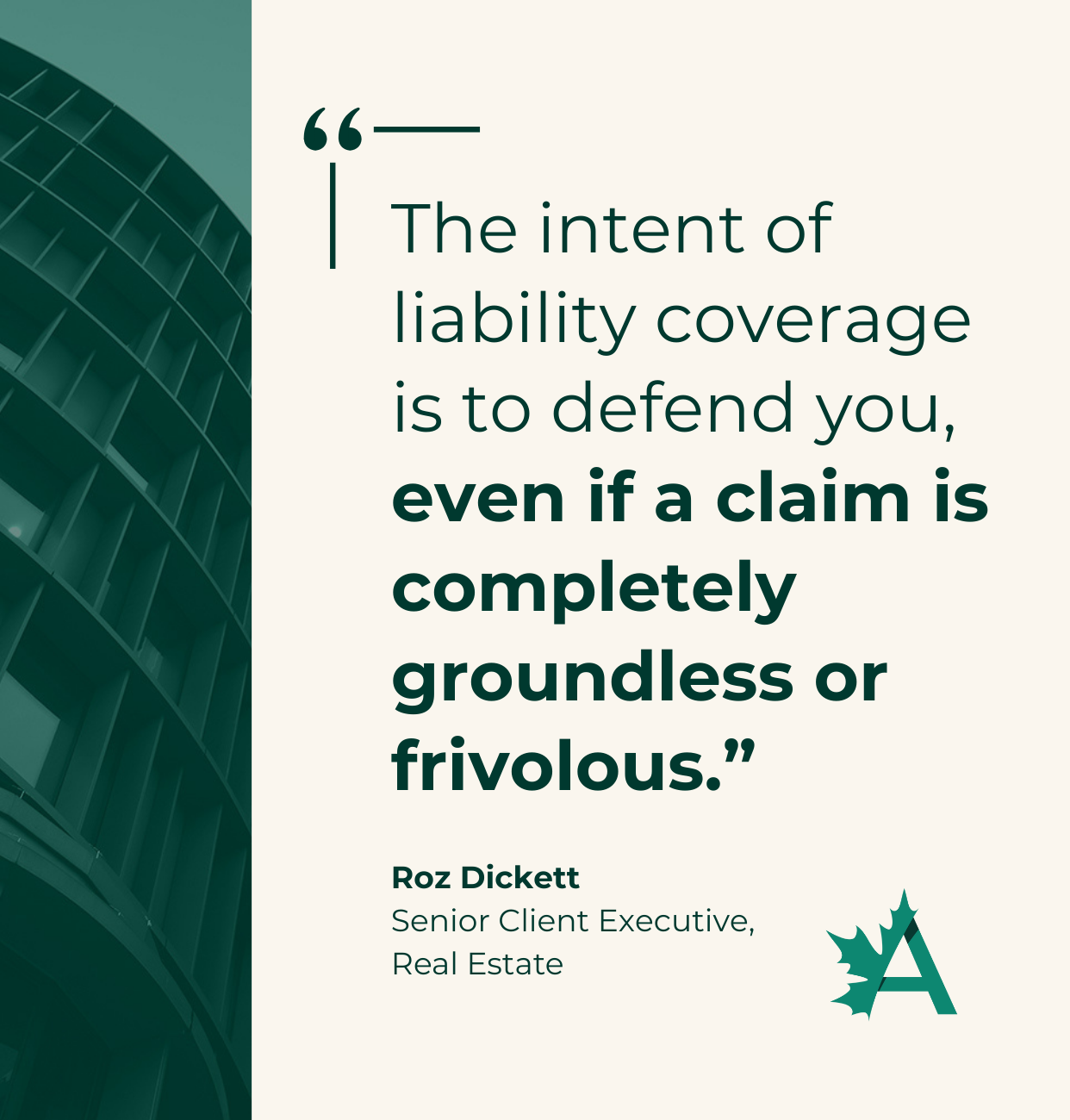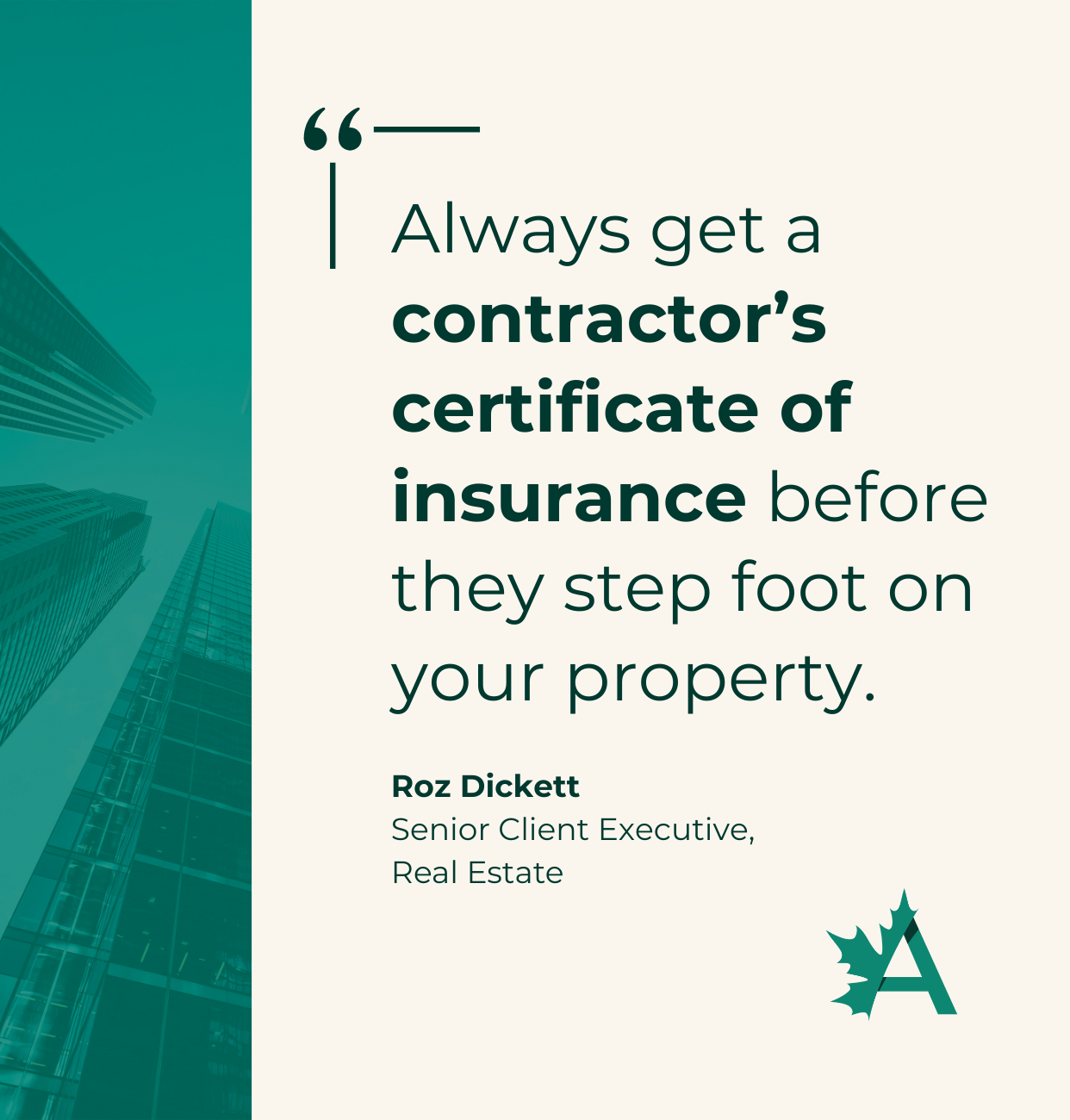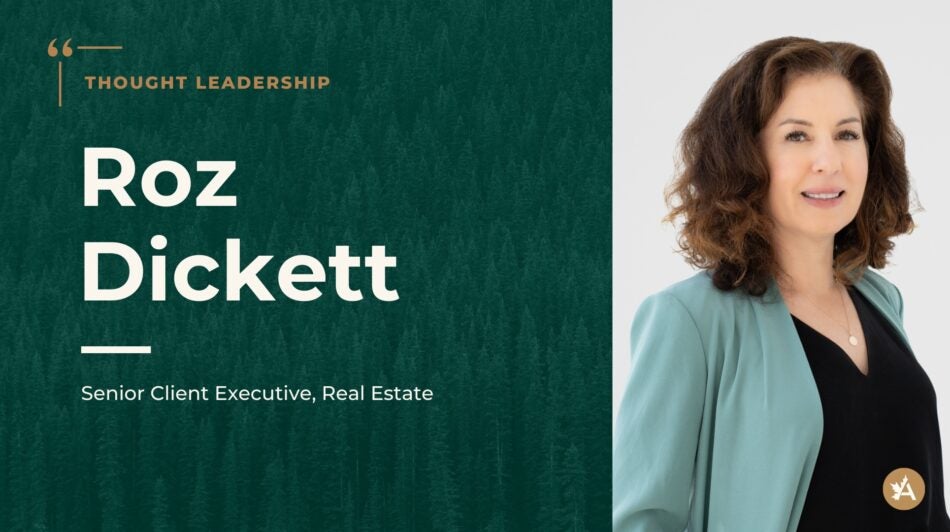From slip-and-fall injuries to contractual disputes, liability risks are part of real estate ownership and management. With more than 20 years of experience advising leading property developers and managers, Roz Dickett provides her expert insights on managing liability exposures. Learn how to protect your properties and reputation with practical steps that help you prevent claims, navigate incidents and ensure your insurance responds when it matters most.
Owning and managing real estate means more than maintaining physical spaces. It comes with a responsibility to protect the people who use them and the investments behind them. A single maintenance issue, contractor mishap or an unforeseen accident can quickly escalate into a claim.
Liability claims can disrupt operations, damage your reputation and create significant financial strain. No matter the asset type — strata buildings, commercial properties, mixed use — or size of your holdings, being proactive with liability risk management helps ensure you’re ready to respond when something goes wrong.
To protect your assets, it is essential to understand how your liability coverage works, where your exposures lie and what steps you can take to reduce the likelihood and impact of a claim. At Acera Insurance, we understand real estate risks and tailor coverage to help ensure your insurance responds when it matters most.
3 liability insurance considerations for real estate portfolios
1. Commercial general liability
Commercial general liability policies protect against a variety of third-party claims. While a broad policy will cover more than bodily injury and property damage, these remain the most fundamental exposures that commercial general liability insurance covers. In a real estate setting, common bodily injury and property damage claims include:
- a visitor slipping on an icy walkway.
- a malfunctioning parkade gate damaging a vehicle.
- an elevator failing to level properly, causing passenger injury.
- water from a building system leak damaging a tenant’s property.

Other potential exposures that can be covered include personal injury claims such as:

Libel or slander

Liability arising from use of non-owned vehicles

Tenants’ legal liability for rented premises
Commercial general liability coverage applies to accidental and negligent acts, not deliberate harm, and includes a duty to defend. This means that your insurer will cover legal costs and any resulting settlements up to your policy limit, even if the claim is ultimately groundless or frivolous.
2. Adequate liability coverage limits
For real estate schedules, your overall exposure to high-severity liability claims increases as your property holdings expand. More properties, tenants, visitors and contractors mean more opportunities for claims, and when they occur, the financial impact can be significant. Ensuring you have appropriate limits in place prepares you for worst‑case scenarios. This can be achieved through a “tower” structure, a cost‑effective way to layer additional limits without a proportional increase in premium.
Understanding how limits are applied is equally important. Wherever possible, we aim to avoid general aggregate limits. Under a general aggregate, the stated amount is the total payable for all claims during a policy period. For example:
General aggregate

A $10 million aggregate could be exhausted after a single significant loss.
No aggregate

The same $10 million limit would apply separately to each occurrence.
The exact amount of coverage you need will depend on your property type, portfolio size and risk profile.
3. Liability insurance exclusions
Knowing your policy’s exclusions is as essential as knowing what it covers. A general liability policy won’t cover property in your care, custody and control — meaning damage to the property you own or are directly responsible for would need to be addressed by property insurance.
For temporary spaces you rent, such as a hotel ballroom for an annual general meeting, tenants’ legal liability coverage can help bridge that gap. Some real estate policies also have premises restrictions that limit liability coverage to the addresses listed in your policy schedule. If you host an event or operate in another location not listed, you may need to notify your broker to extend coverage.
5 best practices for reducing liability in real estate
1. Hire insured contractors
When hiring third‑party contractors for work on your property (repairs, renovations or routine maintenance), it is critical to ensure they carry adequate insurance. Always request a current certificate of insurance that:
- names your organization as an additional insured.
- confirms coverage limits, ideally a minimum of $5 million.
- lists coverage types relevant to the work being done.
By doing this, you transfer some of the liability risk to the contractor’s insurer. Without this protection, liability for injuries or damage that happens on site may fall back to you or your insurer.

2. Keep volunteers safe
Especially in strata communities, volunteers should never be assigned high‑risk tasks such as working on roofs, performing electrical repairs or handling heavy construction. Serious injuries during unsafe work could leave both the volunteer and the strata corporation without coverage. Establish clear guidelines outlining what volunteers can and cannot do and hire insured professionals for any task that carries elevated risk.
3. Review contracts before starting major projects
Before work begins, have both your legal counsel and your insurance broker review the contract. They can:

Ensure insurance requirements are clear, fair and enforceable.

Confirm the contractor’s coverage is appropriate for the scope of work.

Identify clauses that could shift liability unfairly to you.
Failing to review contracts can result in costly gaps in protection or disputes about who is responsible if something goes wrong.
4. Implement incident reporting procedures
When an incident occurs, document it promptly:
- Record the date, time and location.
- Gather witness statements and contact information.
- Take photos or videos.
- Notify your insurance provider immediately.
Capturing details while they’re fresh helps protect you in case of future disputes, especially if witnesses move away or evidence is lost.
5. Consider personal excess liability or umbrella insurance
For owners with significant assets, liability claims can exceed home, condo or auto policy limits. Personal umbrella policies provide an extra layer of protection by increasing liability limits across multiple personal policies.

For example, a $5 million personal umbrella policy could extend the limits of several underlying policies for a relatively modest additional premium.
Why expert guidance matters in real estate liability
When it comes to liability insurance, the policy itself is only part of the equation. How it’s structured, what it excludes, and how limits are applied can all influence how well it responds to a claim.
That’s why working with an advisor who specializes in real estate makes a difference. As Canada’s largest independent and employee-controlled insurance brokerage, Acera Insurance has access to a broad range of insurers that enable us to secure the widest available coverage options at competitive terms. We help property owners and managers:
- understand the intent of their coverage and how it will respond in different scenarios.
- review insurance language in contracts tied to high-value capital projects.
- verify that the carriers we work with have the financial strength to support large-limit placements, conducting independent reviews beyond standard rating agencies.
In a world of constantly evolving liability risks, working with a specialist means you have a risk management partner to rely on year-round. Connect with a real estate insurance specialist at Acera Insurance to review your limits and ensure your portfolio is protected before your next renewal.
FAQs
Acera Insurance’s Roz Dickett answers common questions about liability insurance for real estate owners and managers.
Commercial general liability (CGL) insurance protects you if a third party (such as a tenant, visitor or contractor) suffers injury or property damage due to your operations and takes legal action against you. Property insurance, on the other hand, pays for the repair or replacement of physical buildings and assets you own from fire, theft, vandalism and other covered sources of loss. Most property owners need both types of coverage.
The limits you need will depend on several factors beyond property value — including type of property, the volume of foot traffic and the activities taking place on your property. Lenders, investors and business partners may also require proof of specific coverage limits before entering agreements. A busy commercial property accessible to the public has significantly different exposure than a small residential building. A broker with specialized real estate expertise who understands your operations can help you benchmark limits against industry standards and worst-case claim scenarios.
When contractors work on your property, there’s always a chance their activities could cause injury or damage. Even if the contractor is at fault, the property owners are often named in lawsuits for incidents that happened on their premises. Being added as an additional insured means you gain direct protection under the contractor’s policy. Their insurer, not yours, would step in to cover legal defence and settlement costs. This helps transfer risk away from your own policy, protecting your claims history and helping keep your premiums stable over time.
Although standard home and auto insurance does include personal liability coverage, the limits available through these policies may not be enough if you’re faced with a serious lawsuit. A major injury claim or accident could easily exceed those limits, leaving your personal assets at risk. Learn more about personal excess liability, also known as umbrella insurance, by reading “The importance of excess liability for high-net-worth individuals.”
Share this article:

Get weekly tips to protect your business!
Subscribe to our LinkedIn Newsletter. Our advisors’ insights will help you Be Risk Ready.
Roz Dickett brings 21 years of real estate risk management and insurance experience and proudly works with Vancouver’s leading property managers and developers. Connect with Roz at 604.484.0203 or roz.dickett@acera.ca.
Related reading:
- Why real estate insurance requires a specialist – not just a policy
- Global warming is redefining catastrophe exposures
- Policyholders cannot afford to bury their heads in the sand
Information and services provided by Acera Insurance, Acera Benefits and any other tradename and/or subsidiary or affiliate of Acera Insurance Services Ltd. (“Acera”), should not be considered legal, tax, or financial advice. While we strive to provide accurate and up-to-date information, we recommend consulting a qualified financial planner, lawyer, accountant, tax advisor or other professional for advice specific to your situation. Tax, employment, pension, disability and investment laws and regulations vary by jurisdiction and are subject to change. Acera is not responsible for any decisions made based on the information provided.

